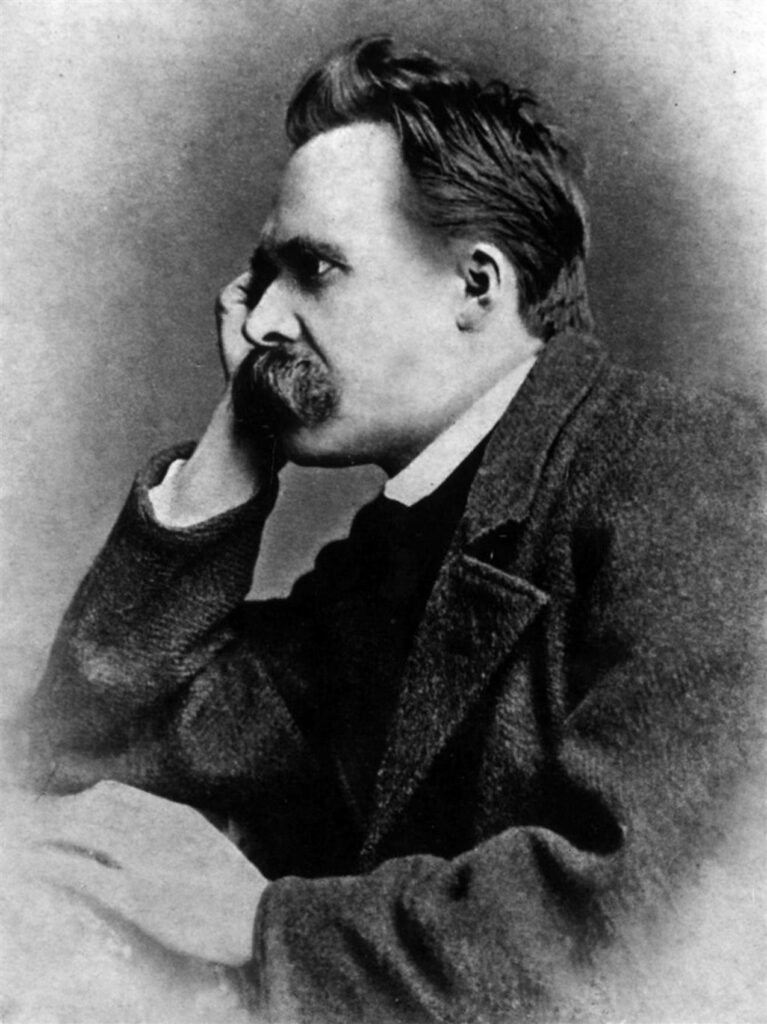Nietzsche's masterpiece, famous for "God is dead" - Nietzsche's "Zarathustra" Synopsis and Comments

I would like to introduce "Zarathustra" published by Nietzsche between 1883 and 1885. I read the Chikuma Shobo edition of "Nietzsche's Complete Works 9 and 10: Zarathustra" translated by Denzaburo Yoshizawa.
Let's take a quick look at the book.
Finally, in the third part of this book, Zarathustra announces the idea of eternal return as a certain terrifying abyssal thought. What is the true meaning of life under the modern nihilism of the death of God? Nietzsche explains how to proactively transcend the critical situation of modern man by thoroughly addressing nihilism itself and affirming the moment of life. This is a true philosophical book that should be called a fatal book for all, in which the essence of Nietzsche's anthropology is hidden. The lower part of the book contains parts three through four of the four-part series. In addition, the translation and notes have been greatly enlarged and revised based on the results of recent Nietzsche studies.
AmazonProducts Page.
Zarathustra" is Nietzsche's masterpiece, famous for the phrase "God is dead."
I have read this book many times in my life. I have fond memories of reading it at different times when I was a student, a graduate student, and a working professional.
However, as I discussed a bit in a previous article, this book is still a dangerous book.
This is because the book, which seeks to destroy the existing order, uses quite aggressive language, and it is possible that reading it will infect you with it.
For some reason, reading "Zarathustra" makes me feel as if I am buoyed by a fever, as if I am stronger. Frankly, every time I read it, it makes me feel like I know the world better than others, and from there I feel like I'm looking down on everyone around me (maybe that's because I was young, maybe that's because my reading style was immature...).
Recently, however, my impression of Nietzsche has changed through reading various reference books and other works.
In this article I will not discuss Nietzsche's ideas such as the idea that "God is dead", the will to power, superhumanity, eternal regression, etc. It is impossible for me, a non-expert, to explain those esoteric ideas.
However, there is one passage that always leaves a strong impression on me when I read "Zarathustra," which is a parade of such difficult ideas. That is the chapter "About the Flies in the Marketplace. Since we are here, I would like to look at some of them.
All great things happen far from markets and prestige. From time immemorial, the originators of new values have lived far from markets and prestige.
Flee, my friend, into your solitude. I see you being stung to pieces by the poisonous flies. Flee, my friend, to the place where the wind blows wild and strong!
Escape into your solitude! You have lived too close to the petty wretches. Dodge from their invisible vengeance! Against you, they are bent on revenge.
No longer raise your arms against them! They are too numerous to count. And it is not your destiny to be a fly swatter.
These petty wretches are too numerous to count. And in many cases, mere raindrops and weeds have been the cause of the collapse of imposing buildings.
You are not a stone, but you have already been sagged by many drips. You will be shattered and crushed by many more drips. (Omitted)
They want your blood, quite innocently. Their anemic souls desire blood - hence, they stab with utter innocence.
But you, O deep one, you are so deeply troubled by even the smallest wound. Moreover, while you were still healing, the same poisonous insect crawled all over your hand.
Chikuma Shobo edition, translated by Denzaburo Yoshizawa, Nietzsche's Complete Works 10: Zarathustra, vol. 1, p. 95-96
Nietzsche received little public recognition during his lifetime. His debut novel, "The Birth of Tragedy," was met with fierce opposition from the scholarly world, and his path to scholarly glory was cut short. He was not understood by the public or by scholars.
The anguish of not being understood by anyone ... and at the same time, the intense feelings for those who thrive in the world ...
Such things can be felt in Nietzsche's words.
We will also look at one more word immediately following this one. Here is another terrific one.
They punish you for all your virtues. The only thing they will forgive you from the bottom of their hearts is your various failings.
You, meek and fair-minded, say, "They are not to blame for their petty existence. But their narrow-minded souls think, "All great beings are culpable.
Even if you are mild toward them, they still feel that they are despised by you. So they repay your favor with a number of subtle assaults.
Your unspoken pride is always against their taste. If you become humble enough to be vain, they will be thrilled.
When we recognize what a man is, we also inflame him as such. Therefore, beware of petty men!
In your presence, they feel their own baseness. There, their lowliness becomes an invisible vengeance that burns faintly and fiercely against you.
Have you not noticed that when you walk up to them, they are often silent, and their power leaves them like smoke leaves a dying fire?
Yes, my friends, you are the seed of a guilty conscience to your neighbors, because they do not deserve you. For they do not deserve you. Therefore they hate you, and they long to suck your blood.
Your neighbors will always be poisonous flies. What is great in you - itself - cannot help but make them more toxic, more and more like flies.
Flee, my friend, into your solitude and over there, where some wild and strong wind blows! It is not your destiny to be a fly swatter.
Chikuma Shobo edition, translated by Denzaburo Yoshizawa, Nietzsche's Complete Works 10: Zarathustra, vol. 1, p. 97-98
Until now, this had seemed to me to be a place where Nietzsche's aggressiveness, his pride in being a solitary philosopher, was on tremendous display.
However, reading Nietzsche's biography and rereading it after learning more about his life and person, I have a different emotional reaction than before.
Wasn't Nietzsche suffering from the loneliness of not being understood by anyone? He must have suffered from the reality of being surrounded by people who did not want to understand him. I began to think that these offensive words were an expression of the bitterness of his loneliness and loneliness.
Actual,The Nietzsche Letters.Nietzsche was candid with his friend about the pain of his loneliness when he read the
To Erwin Rohde [Nice, February 22, 1884].
Look, honey, I don't know how it happened. But when I read your previous letter, especially when I saw the picture of your beautiful child, I felt as if you were holding my hand and staring at me gloomily. Yes, it was as if you were saying, "How can it be that we have so little in common after all, as if we live in different worlds? It's as if you were trying to say, "We used to be .......
Hey, everyone I love is like this to me. All of them.It has passed away.We will continue to see each other, we will continue to talk to each other, but that's for not being silent. We will continue to see each other and talk to each other, but only to keep quiet, - we will continue to write to each other, but only to keep quiet. But the look in their eyes tells the truth, - (it sounds so good to me) - "Mr. Nietzsche, you are nowI'm totally alone.!" And.
In fact, I've come to this point now. -John
During this time I have been moving forward on my path, originally this is one journey, one voyage. -I have lived in the city of Columbus for several years, and not without reason. -Mr.
My "Zarathustra" is threecurtainand completed. You have the first act. I hope to send you the next two acts in four or six weeks. A kind of future abyss, something terrifying, especially in the bliss of Zarathustra. Everything in it is my own, it has no prototype, no contrast, no precedent. In it all is my own, it has no prototype, no contrast, no precedent.Alive.The "Mere Old Man" has come back to the world with a different face. (The world is back again with another face.)
I'm sorry, I'm not going to come clean to strangers about these things. But you were once myLanguageYou are the only one who can say that. -You're the only one who can say that.
Anyway, I am already against all kinds of poetry, and I am strictlyI've been abused.But myLanguagewith a last-minute understanding,poetThe first time I saw a new product, I was surprised to find that it was so popular.
Oh, my dear boy, what a crazy, silent life I am living! All alone, like this, all by myself! And no "children."
Do me a favor. I am sincere to you.
Your Nietzsche.
Chikuma Shobo edition, translated by Satoshi Tsukagoshi and Yoshio Nakajima, The Complete Works of Nietzsche, Vol. 2: Nietzsche's Letters II, Poems, p. 21-23.
Many of you may be surprised to read this Nietzsche letter.
Nietzsche, who used to write such aggressive and harsh sentences, reveals his weakness so frankly.
In "Nietzsche's Letters," we can see Nietzsche's true face. It is a very different and sensitive image of Nietzsche that we have in our minds. It is a very different Nietzsche from the one we have imagined, and it changes our impression of Nietzsche.
Then, in the harsh words of attack in "Zarathustra," I also feel "the pain of loneliness that no one understands. Behind the strong words, I read Nietzsche's loneliness.
However, Nietzsche, like Schopenhauer, added a harsh criticism of the world's worldliness. It is clear that he did not simply express his strong words out of loneliness that he was not understood. He expresses great anger at the reality that people are not seeking a higher spirituality, but are instead biting each other like poisonous flies. And the academics and intellectuals who should be working to change that are also complicit in it. The publishing industry, too, will not look at you if you don't sell.
His words may reflect not only the pain of not being understood, but also the despair of such a world and his own powerlessness. These ideas of Nietzsche areSchopenhauer(at sentence-end, falling tone) indicates a confident conclusionOn Reading."There is a great deal of overlap between the two.
In this article, I have discussed the theme of feeling Nietzsche's solitude in "Zarathustra". Of course, this is only my impression of one part of this lengthy work.
The book is richly illustrated with Nietzsche's central ideas. I am sure that each passage will bring to mind a variety of thoughts. When I first read this book, I had no idea of Nietzsche's solitude. I felt more "solitude" than "loneliness. Even now, the image of "loneliness" has not disappeared, but I feel a different atmosphere from when I first read it.
Since even the same person is like this, it is only natural that each person feels differently. I think the appeal of Nietzsche is that it can be read in a variety of ways.
The above is "Feeling the loneliness of Nietzsche's solitude in "Zarathustra" - the famous masterpiece of "God is dead".
Next Article.
Click here to read the previous article.
Click here for a list of Nietzsche's recommended works and reference articles.
Related Articles







































